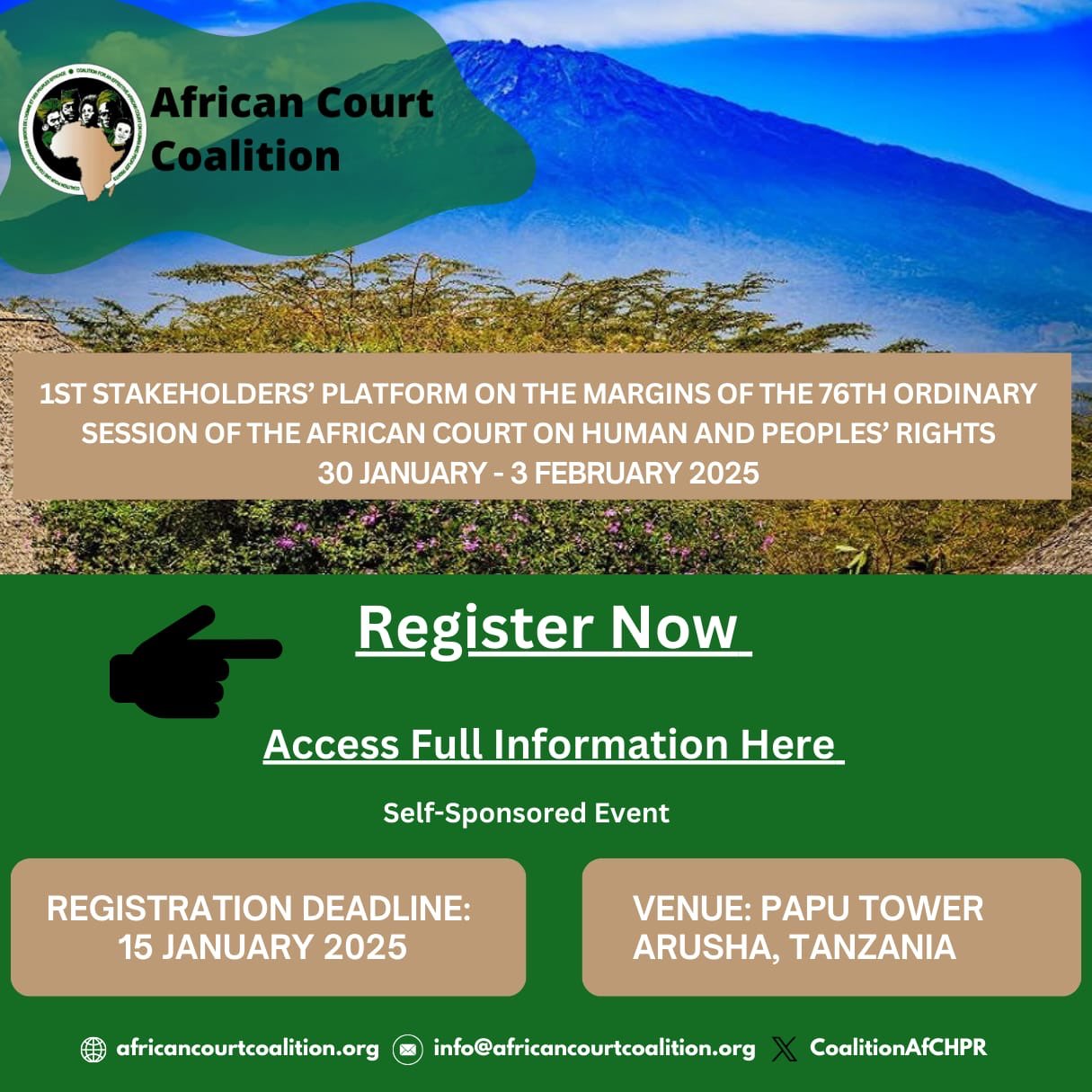STAKEHOLDERS’ PLATFORM ON THE MARGINS OF THE 76TH ORDINARY SESSION OF THE AFRICAN COURT ON HUMAN AND PEOPLES’ RIGHTS

[Click here for Registration & Travel details 🔗]
CONTEXTUAL BACKGROUND:
For African citizens to benefit from the existence of the African Court on Human and Peoples’ Rights (the African Court), access to the Court should not be a major problem, and when access is guaranteed, compliance with its decisions should follow course. This is because central to the effectiveness of any regional human rights organ is access, and compliance of decisions by State Parties.
The African Court was established to complement the protective mandate of the African Commission on Human and Peoples’ Rights (the Banjul Commission) by strengthening the human rights protection system in Africa and ensuring respect for and compliance with the African Charter on Human and Peoples’ Rights, as well as other international human rights instruments through judicial decisions. The African Court which is the judicial arm of the African Union (AU) was established by virtue of Article 1 of the Protocol to the African Charter on Human and Peoples’ Rights on the Establishment of an African Court on Human and Peoples’ Rights (the Court Protocol). It was adopted on 9 June 1998 in Ouagadougou, Burkina Faso, and entered into force on 25 January 2004. The Court started its operations in the year 2006 in Arusha, Tanzania where it has its permanent seat.
Twenty years after the adoption of the Court Protocol, a significant number of African citizens are still not able to access the African Court directly due to a very low number of countries that have deposited Article 34(6) Declaration of the Court Protocol to allow direct access to the African Court for individuals and Non-Government Organizations (NGOs) with observer status before the Banjul Commission. Out of the 34 countries that have ratified the Court Protocol, only eight countries have deposited Article 34(6) declaration, these are; Burkina Faso, Ghana, Guinea Bissau, The Gambia, Mali, Malawi, Niger and Tunisia. And in the span of four years between 2016 and 2020, four (4) States withdrew from Article 34(6) declaration, limiting direct access to the African Court for individuals and NGOs, these are; Rwanda, Tanzania, Benin and Cote d’Ivoire. This poses a great challenge to the mandate of the African Court and makes it increasingly challenging for victims of human rights violations to access justice and seek reparations when they are not satisfied with local remedies. Although indirect access to the African Court for NGOs exists through referrals of cases from the Banjul Commission to the African Court, such avenue has been limited in scope and efficacy.
Nevertheless, compliance with the decisions of the African Court by State Parties is another key challenge that not only affects the effectiveness of the Court, but also victims of human rights violations from obtaining reparations. Implementation of the African Court decisions currently stand at less than 10%.
While there are continuing separate efforts by different stakeholders towards enhancing the effectiveness of the African Court, the Coalition believes that a convening that brings together diverse stakeholders is more ideal to exchange ideas and deliberate on the roles and strategies that can be adopted to enhance direct access to the African Court for individuals and NGOs, as well as discussions around enhancing implementation of decisions of the African Court.
OBJECTIVE:
The objective of the Stakeholders’ Platform is to bring together diverse stakeholders to discuss on various matters that are pertinent to the mandate of the African Court, and facilitate concerted efforts that will enhance the effectiveness of the Court, and that of the African Human Rights system in general. The Platform will also serve as an open space to constructively engage with the African Court.
WHAT THE STAKEHOLDERS’ PLATFORM SEEKS TO ACHIEVE:
The Stakeholders’ Platform seek to achieve the following long-term results;
Increase access to the African Court for African citizens and NGOs
Strengthen implementation of decisions of the African Court by State Parties to the African Court Protocol.
Integration of the jurisprudence of the African Court at national and regional level.
Foster systematic conversations around obligations of the AU Members States and the AU relevant organs, and their respective roles in the effectiveness of the African Court.
Strengthen complementary relationship between the African Court, the Banjul Commission and the African Committee of Experts on the Rights and Welfare of the Child (ACERWC).
Contribute to the effectiveness of the African Court by monitoring its developments, share constructive ideas, and encourage stakeholders’ initiatives that are beneficial to the positive developments of the Court.
THEMATIC FOCUS FOR THE 1ST STAKEHOLDERS’ PLATFORM:
The 1st Stakeholders’ Platform will serve as a pilot phase to explore key issues that are central to the effectiveness of the African Court which are;
Access to the African Court for individuals and NGOs; and
Implementation of decisions of the African Court.
The Platform will also be used to hold a consultative session to explore ideas that will shape up subsequent Stakeholders’ Platforms.
A session dedicated to the 2025 AU theme, “Justice for Africans and People of African Descent Through Reparations” AND the 2025 African Court theme “Advancing Justice through Reparations” will also be included in the discussions.
The structure of discussions will be through panel sessions of which all participants will have an opportunity to participate and contribute in.
The event is finished.
Local Time
- Timezone: America/New_York
- Date: 30 Jan 2025 - 03 Feb 2025
- Time: All Day
More Info
Category
Organizer

-
African Court Coalition
-
Website
https://africancourtcoalition.org/ The Coalition for an Effective African Court on Human and Peoples’ Rights (the African Court Coalition) is a membership-based organisation made up with Civil Society Organisations, independent human rights institutions, and individual members. The Coalition was formed during the first conference for the promotion of the Protocol to the African Charter on Human and Peoples’ Rights establishing the African Court on Human and Peoples’ Rights in Niamey, Niger in May 2003. The Coalition was formally registered as an NGO in Tanzania in September 2007, its Secretariat is in Arusha, Tanzania where the African Court is also based.
Next Event
-
Jukwaa Huru -
Date
- 10 Oct 2025 - 29 Nov 2025
-
Time
- 7:30 pm - 11:00 pm








Responses